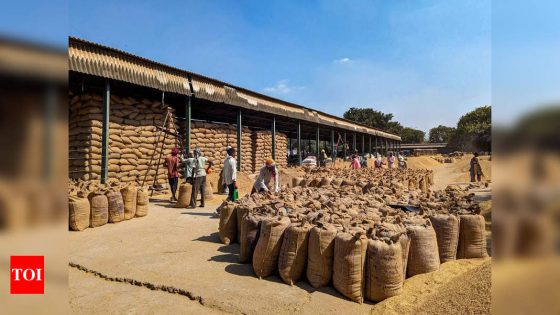NEW DELHI: Feeling the pinch of curbs on exports of Indian rice, sugar and onions, Malaysian minister for plantation and commodities Datuk Seri Johari Abdul Ghani on Thursday invoked “friendly ties” to say that they would like New Delhi to have some “arrangement” to ensure their supply.
Ghani said India’s restrictions on exports of agri commodities are bad for Malaysia.“We need sugar, onions and basmati rice. Our domestic rice production meets just 65% of our requirement and demand for basmati rice is rising. Around 25% of our people prefer basmati rice. We believe that India can allocate some quantities of these essential commodities for Malaysia even if there is an overall ban,” he told reporters.
India, the world’s biggest exporter of rice and onions and the second biggest exporter of sugar, had imposed restrictions on shipment of these commodities to keep domestic prices under check.
The reference to “friendly ties” assumes significance in view of the tension between the two countries over Malaysia’s refusal to extradite radical Islamic preacher, Zakir Naik, who is wanted here for a series of terror-related crimes. Naik, identified by many terror suspects as the inspiration for their turn to radicaliasation and jehadi violence, has since been given Malaysian citizenship, much to India’s chagrin.
Earlier speaking on the sidelines of an event organised by the Indian Vegetable Oil Producers’ Association, Ghani said, “If India opens up, it will be beneficial for Malaysia.” Malaysia, the second biggest exporter of palm oil to India, is caught in a challenging position due to export restrictions on food items.
He also addressed growing concerns over health implications of the use of palm oil. Malaysia has been among the biggest exporters of palm oil to India and the minister said that there is no replacement of palm oil in future. Ghani said they don’t see any decline in export of palm oil to India considering population growth.
He also met agriculture minister Shivraj Singh Chouhan on Thursday and offered its support in research and development, seed supply and management expertise to India in its oil palm mission. Under the the National Mission for edible oils, govt aims at increasing crude palm oil production to 28-30 lakh tonne by 2032-33. India imported 97.6 lakh tonne of palm oil and 30 lakh of this came from Malaysia in the oil year 2022-23 (October-September).
Ghani said India’s restrictions on exports of agri commodities are bad for Malaysia.“We need sugar, onions and basmati rice. Our domestic rice production meets just 65% of our requirement and demand for basmati rice is rising. Around 25% of our people prefer basmati rice. We believe that India can allocate some quantities of these essential commodities for Malaysia even if there is an overall ban,” he told reporters.
India, the world’s biggest exporter of rice and onions and the second biggest exporter of sugar, had imposed restrictions on shipment of these commodities to keep domestic prices under check.
The reference to “friendly ties” assumes significance in view of the tension between the two countries over Malaysia’s refusal to extradite radical Islamic preacher, Zakir Naik, who is wanted here for a series of terror-related crimes. Naik, identified by many terror suspects as the inspiration for their turn to radicaliasation and jehadi violence, has since been given Malaysian citizenship, much to India’s chagrin.
Earlier speaking on the sidelines of an event organised by the Indian Vegetable Oil Producers’ Association, Ghani said, “If India opens up, it will be beneficial for Malaysia.” Malaysia, the second biggest exporter of palm oil to India, is caught in a challenging position due to export restrictions on food items.
He also addressed growing concerns over health implications of the use of palm oil. Malaysia has been among the biggest exporters of palm oil to India and the minister said that there is no replacement of palm oil in future. Ghani said they don’t see any decline in export of palm oil to India considering population growth.
He also met agriculture minister Shivraj Singh Chouhan on Thursday and offered its support in research and development, seed supply and management expertise to India in its oil palm mission. Under the the National Mission for edible oils, govt aims at increasing crude palm oil production to 28-30 lakh tonne by 2032-33. India imported 97.6 lakh tonne of palm oil and 30 lakh of this came from Malaysia in the oil year 2022-23 (October-September).
Source Agencies




